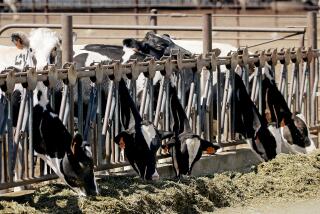Artichokes With Hickeys
- Share via
By any reasonable measure of fairness, this should be a good year for artichoke growers. They are due. Three of the last four seasons have been disasters.
And sure enough, all signs are that this spring harvest, which will begin sometime next week, should be a big one--both in terms of quality and quantity.
“We don’t want to hex ourselves,” says Mary Comfort, communications director of the California Artichoke Advisory Board. “We were in the same boat four years ago and ended up in a very unfortunate situation. But we’re sitting here with our fingers crossed.”
The “unfortunate situation” Comfort is referring to was the spring flood of 1995. Much of downtown Castroville--the little town that is the hub of artichoke production in California--was literally under water. Entire fields were washed out and needed to be replaced, slashing production in 1996 as well.
Last year was nearly as bad. El Nin~o hit hard the early part of spring, and though nothing ended up under water, the area received more total rainfall than it did in 1995.
Actually, this year’s artichoke bonanza is getting started early. Thanks to freezing temperatures at the end of last year, you can get bargains in frost-damaged artichokes (growers prefer to call them “winter-kissed”).
The frost damage shows itself as a brownish or grayish burn on the outside of the artichoke. Once the ‘choke is cooked, that area will scrape away quite easily, leaving a perfect artichoke.
In addition, Comfort says the December freeze may actually have helped this spring’s crop. “There’s something about having to weather those freezing temperatures back in December that really brings a big crop,” she says. “The same thing happened in December of ‘90, and we had really big artichokes in spring ’91.”
Still, anything can happen in central California in the spring.
“The flood year was shaping up just like now,” says Comfort. “The plants were really gorgeous and we were ready to rock. Then the levees didn’t hold.”



